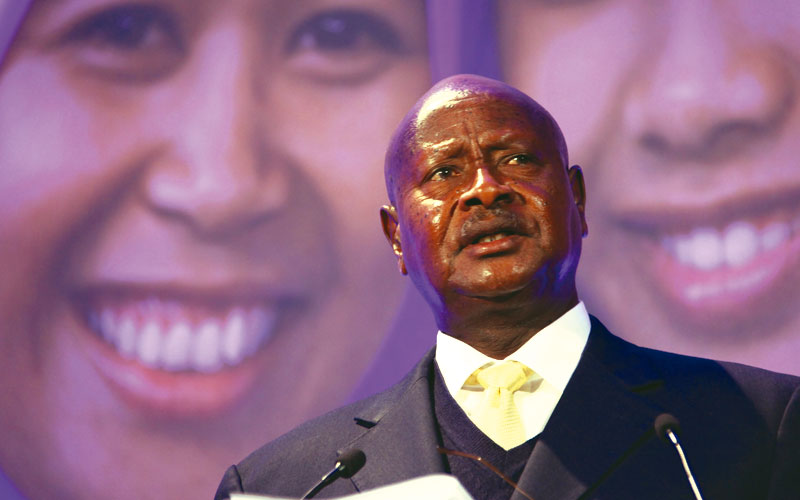President Yoweri Museveni first came to power after a successful five-year guerrilla struggle during the 1980s. He has stood for, and won, four democratic elections since then, making notable economic and social improvements to Uganda along the way.

Born to a family of cattle farmers in western Uganda in 1944, Mr. Museveni attended missionary schools as a child before leaving for Tanzania to study political science and economics at the University of Dar es Salaam. There, he became chairman of a leftist student group allied with African liberation movements and also fought in the Front for the Liberation of Mozambique (Frelimo), where he learned the techniques of guerrilla warfare.
When the Ugandan dictator Idi Amin came to power in Uganda in 1971, Museveni founded the Front for National Salvation, which helped overthrow Amin in 1979. He then went on to hold posts in transitional governments and in 1980 ran for president of Uganda.
However, when the elections – which were widely believed to have been rigged – were won by Milton Obote, Museveni formed the National Resistance Movement which eventually seized control of the country in 1986. After declaring himself as President, his National Resistance Movement ran Uganda as a one-party state until a referendum brought back multi-party politics in 2005. His current term began in 2011.
President Museveni has been credited with restoring stability and economic growth to Uganda following years of civil war and repression under Milton Obote and Idi Amin before him.
Mr. Museveni introduced democratic reforms and was also credited with substantially improving human rights, notably by reducing abuses by the army and the police.
Having enjoyed the support of the international community in order to revitalize the collapsed economy of which he inherited, he first initiated economic policies designed to combat key problems such as hyperinflation and the balance of payments. Thereafter, Museveni eventually embraced the neo-liberal structural adjustments advocated by the World Bank and the International Monetary Fund (IMF). Museveni has won praise from Western governments for his adherence to IMF Structural adjustment programs, such as privatising state enterprises, cutting government spending and urging African self-reliance.
Museveni is a staunch supporter of Pan-Africanism. He was elected chairperson of the Organisation of African Unity (OAU) in 1991 and 1992, and has attributed Uganda’s interventionist foreign policy in Sudan and the Democratic Republic of Congo to the values of Pan-Africanism. Uganda is currently helping to bring peace in Somalia, where the country is providing the vanguard of the peace-keepers.
Perhaps Museveni’s most widely noted accomplishment has been his government’s successful campaign against AIDS. During the 1980s, Uganda had one of the highest rates of HIV infection in the world, but now Uganda’s rates are comparatively low, and the country stands as a rare success story in the global battle against the virus.
Uganda Overview
Since the late 1980s Uganda has recovered from the horror of civil war and economic disaster to become a relatively peaceful, stable and prosperous nation.
During the 1970s and 1980s Uganda was notorious for human rights abuses resulting from the military dictatorship of Idi Amin between 1971 and 1979 and then again with the return to power of Milton Obote, who had been driven out by Amin eight years before. It is estimated that half a million people were killed in this dark period of state-sponsored violence.
After becoming president in 1986 after a coup d’état, Yoweri Museveni helped put the country on the path to peace, democracy and socio-economic development. Following Western-backed economic reforms that produced solid growth and falls in inflation, the country established a strong record of prudent macroeconomic management and structural reform between the 1990s and 2000s, becoming one of the first sub-Saharan African countries to proceed with liberalisation and pro-market policies. The discovery of oil and gas in the west of the country has also done much to boost confidence and development.
While the global economic turndown of 2008 hit Uganda hard, in 2013 Uganda saw the consolidation of macroeconomic stability and a gradual recovery of economic activity, with real GDP growth projected to reach 6.6% in 2014. Strong economic growth has also enabled substantial poverty reduction over the last two decades, meaning the country remains on track towards reaching this category of the World Bank’s Millennium Development Goals (MDGs).
Aside from Uganda’s recent discovery of oil, the country also benefits from its wealth in a variety of other natural resources, including fertile soils, regular rainfall, small deposits of copper, gold, and other minerals. Agriculture is the most important sector of the economy, employing over 80% of the work force, with coffee accounting for the bulk of export revenues.
0 COMMENTS